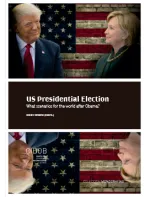Has the Shale Revolution Really Led to US Disengagement from the Middle East?

The US itself was not in need of Middle Eastern oil at that time: it only became a net oil importer in the 1970s as its domestic production peaked and was outstripped by demand growth. This augmented its strategic interest in the region. For a long time it had relied on its “Twin Pillar” policy, which used Iran and Saudi Arabia as proxies to enforce stability in the Persian Gulf. But after the Islamic revolution in Iran in 1979 the more important pillar of this strategy fell and the Soviet invasion of Afghanistan was perceived as a direct threat to the world’s most important oil region.
In reaction to these events the Carter Doctrine was formulated. It aimed to forestall any Soviet bid for hegemony in the region and stated unequivocally:
“Let our position be absolutely clear: An attempt by any outside force to gain control of the Persian Gulf region will be regarded as an assault on the vital interests of the United States of America, and such an assault will be repelled by any means necessary, including military force.”
In later years US involvement grew. In the wake of the liberation of Kuwait from Iraqi occupation in 1991, the US stationed troops permanently in the region. Today its Central Command (Centcom) is based in Qatar and its Fifth Fleet is stationed in Bahrain. Having grown accustomed to the informal security guarantees that come with such involvement, the countries of the Gulf Cooperation Council (GCC) are increasingly disconcerted by what they regard as a deviation from a proven and necessary modus operandi.
With great dismay they watched the US giving up on their fellow autocrat Mubarak in Egypt and noticed that it was only prepared to “lead from behind” during the Western intervention in Libya. This dismay turned into measurable indignation when Assad used chemical weapons against his own people, crossing a red line with impunity that President Obama himself had set. Worse, the Iran nuclear deal led to fears that it could embolden Iranian ambitions for more influence in the region. An interview with Mr Obama in The Atlantic reinforced such fears. Under the headline “The Obama Doctrine” the US President suggested that Saudi Arabia and Iran should “share” the region, instead of drawing it into proxy wars in a competitive bid for regional hegemony. He criticised the negative influence of Saudi Arabia’s state religion, Wahhabism, and its proliferation in countries such as Indonesia and called Gulf countries “free riders” of US security policies. The only issues that might justify direct US intervention, he said, would be an existential threat to Israel, a nuclear Iran or Al-Qaeda activities. In a similar vein, Republican presidential candidate Donald Trump has argued that Saudi Arabia would not exist without US security guarantees and that it should pay for them.
Adding to the worries of Saudis is the 9/11 bill passed by the US senate in 2016, which would allow 9/11 victims to sue Saudi Arabia for alleged sponsorship of Saudi nationals who participated in the terror attacks. The bill was vetoed by President Obama as he was afraid that it could set a dangerous precedent for the United States’ own sovereign immunity rights in foreign countries. Yet Congress struck down his veto and the bill may be turned into law. It was the first time one of Obama’s vetoes had been turned down by a notoriously divided Congress. This does not bode well for Saudi Arabia, which is increasingly viewed negatively in American public discourse. Donald Trump would likely be less favourable to Saudi concerns than Hillary Clinton, although she endorsed both the bill and the Congressional veto override. Hillary Clinton is clearly the candidate of choice of many governments in the Middle East, not only because of Donald Trump’s anti-Muslim rhetoric, but also because of his reckless geopolitical statements. But how real is the pivot towards Asia and the relative neglect of the Middle East in the wake of the shale boom, really?
Instead of being an LNG importer, the US has become self-sufficient in natural gas and is developing its LNG export capacities. It has dramatically increased its oil production and is a major exporter of refined petroleum products and Natural Gas Liquids (NGL). And yet it still is a net importer of crude oil and its refineries are geared towards handling a certain percentage of heavy and sour crudes from the Gulf. Gulf producers have lost little market share in the US: it is rather African light oil producers such as Nigeria, Algeria and Libya who have suffered. Reliance of the US on the Middle East and its main export commodity will persist also because oil is a fungible global commodity whose price is affected by developments elsewhere. If Middle East oil supplies to Asia and Europe were disrupted, it would affect oil prices in the US as well.
All of this serves as a note of caution. Middle East oil will remain important for global supplies in the foreseeable future – the US is still a net importer of crude and of sour crudes from the Gulf in particular. As a world power and guarantor of global commerce it would also be affected by oil crises elsewhere, which would affect the prices and supplies at home. US disengagement from the Middle East will likely remain limited.